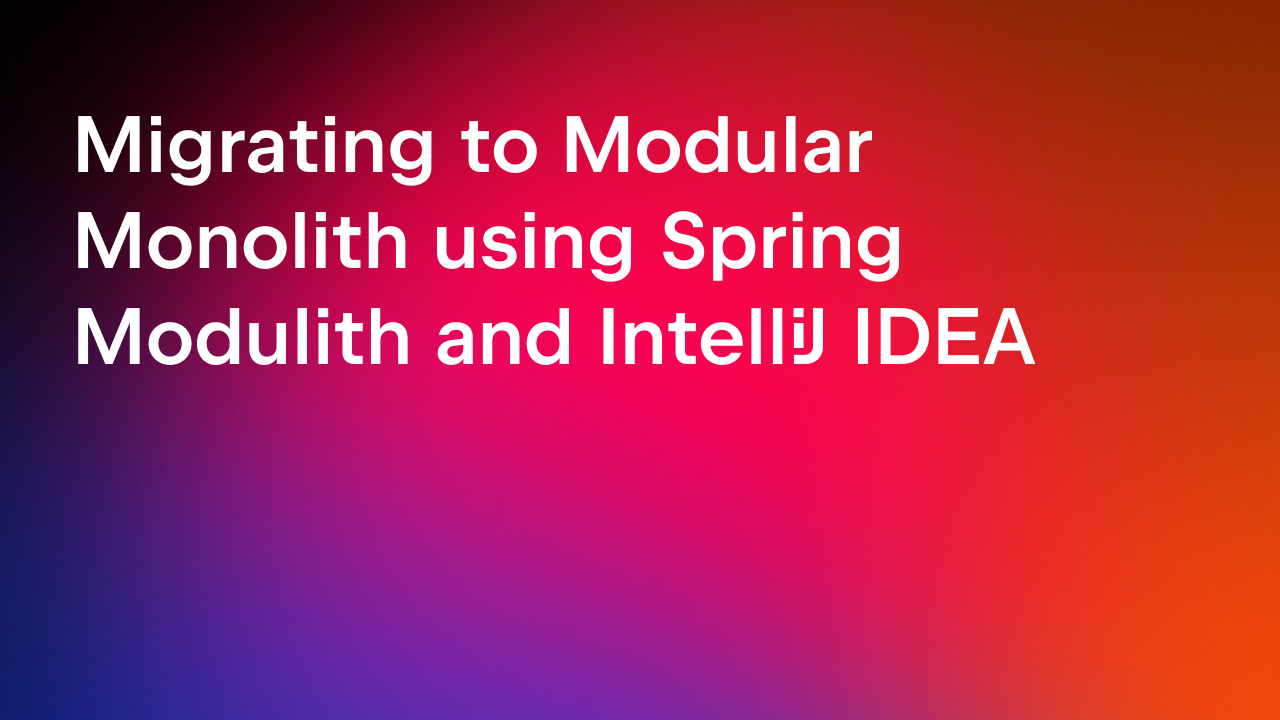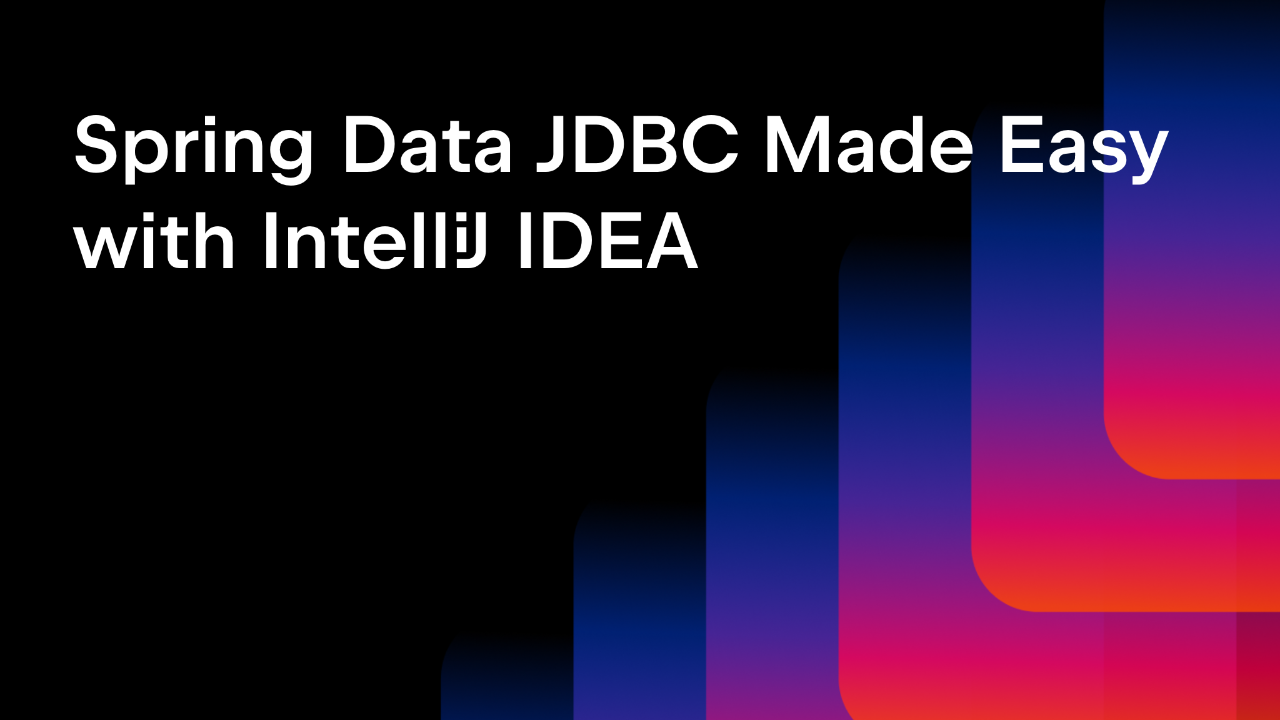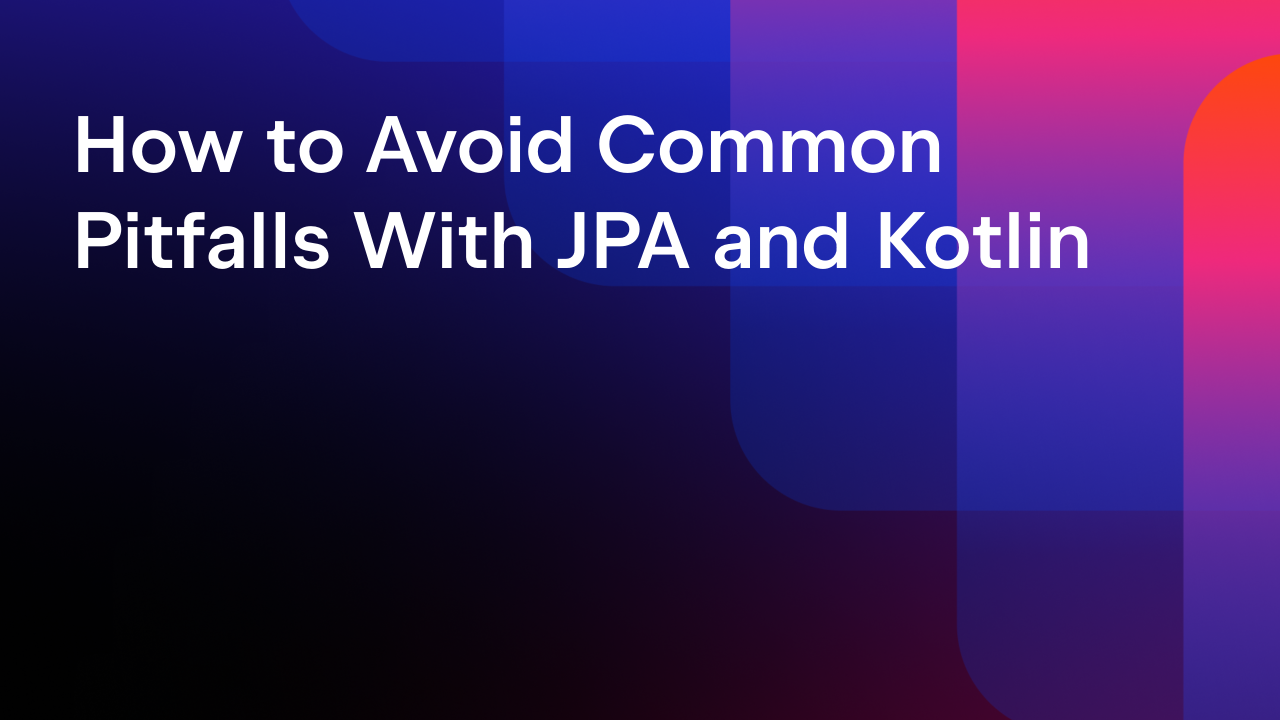IntelliJ IDEA
IntelliJ IDEA – the Leading IDE for Professional Development in Java and Kotlin
Summary of IntelliJ IDEA Conf 2022
We hosted the second edition of ‘IntelliJ IDEA Conf’, a free and virtual conference on the 29-30th of September, 2022, on IntelliJ IDEA’s YouTube Channel.
Our intention with this event was to celebrate the developer community and its desire to learn and improve everyday. I hope we succeeded in this endeavor by hosting sessions by industry leaders and experts on a variety of topics, like Core Java, Kotlin, Spring, Kubernetes, JUnit, JavaFX, and contributing to open source projects. We also hosted sessions on using JetBrains IDEs to address the challenges of remote development, and learn about our brand new IDE – Fleet.
In this blog post, I’ll include links to the recorded sessions, presentations or other materials used by the speakers, our community partners and share a link to a few interesting tweets.
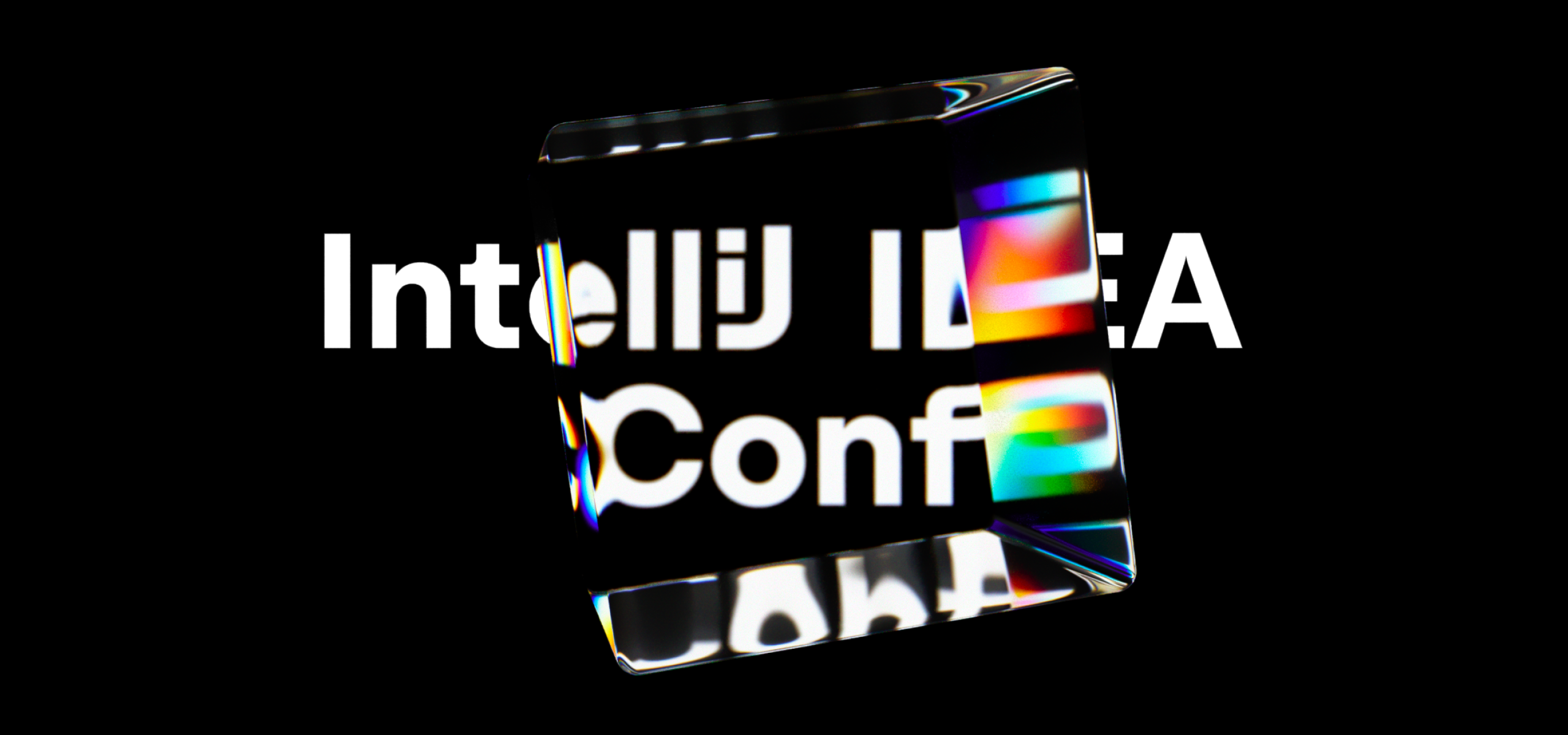
Thanks everyone!
Let me start by thanking our amazing speakers for trusting us with their invaluable time and expertise and presenting with us. Special thanks to Donald Raab for presenting the keynote. Other outstanding speakers who accepted our invitation and presented on the first day are – Vitaly Bragilevsky, Anton Arhipov, Mary Grygleski, and Josh Long (listed in the order of their sessions).
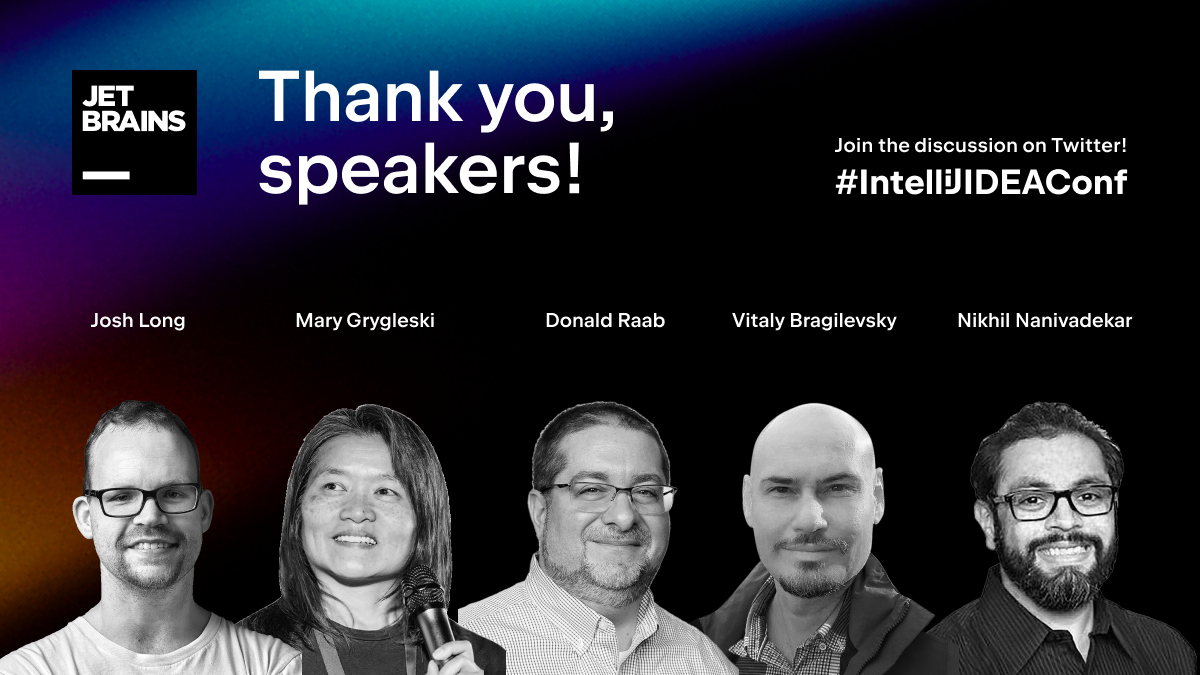
We are thankful to all the speakers who presented with us on the second day of this conference: Nikhil Nanivadekar, Matt Ellis, Marc Philipp, Tomasz Nurkiewicz and Gail Anderson (listed in the order of their sessions).
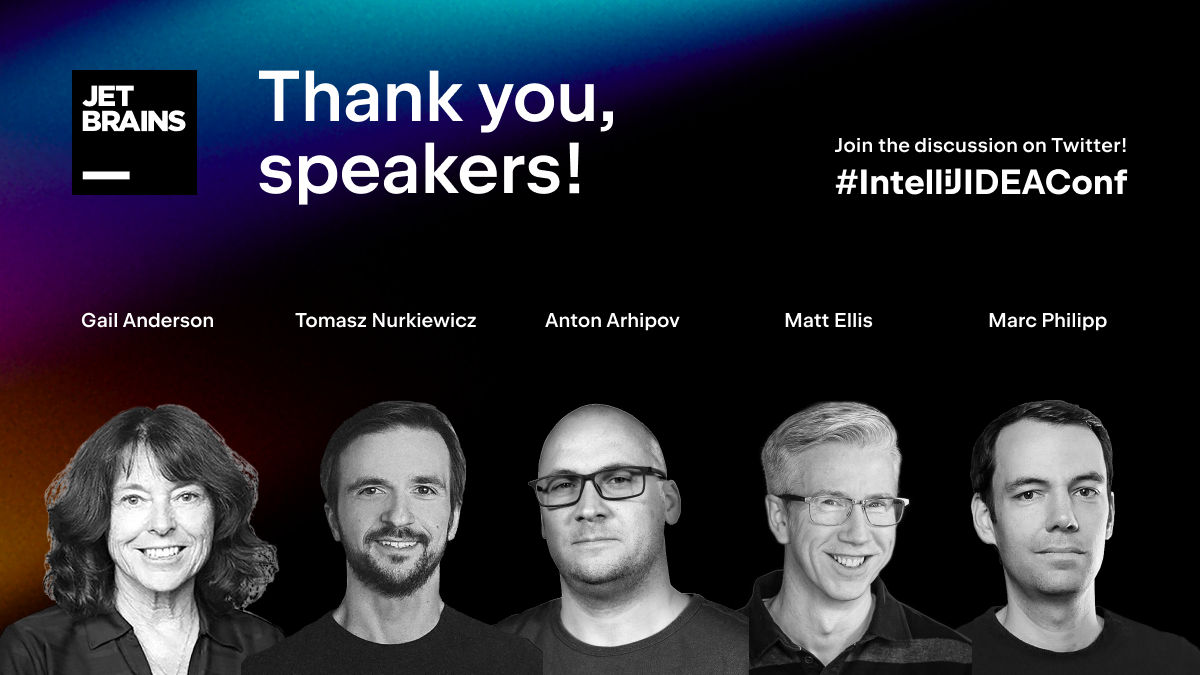
We are grateful to all the user group members and leaders who supported us by partnering with us. To me, every color, hue, tone or letters in the logos that these leaders shared with us represents the love and trust of you all in us at JetBrains. Here’s the collection of the beautiful logos of all the user groups and communities that partnered with us.
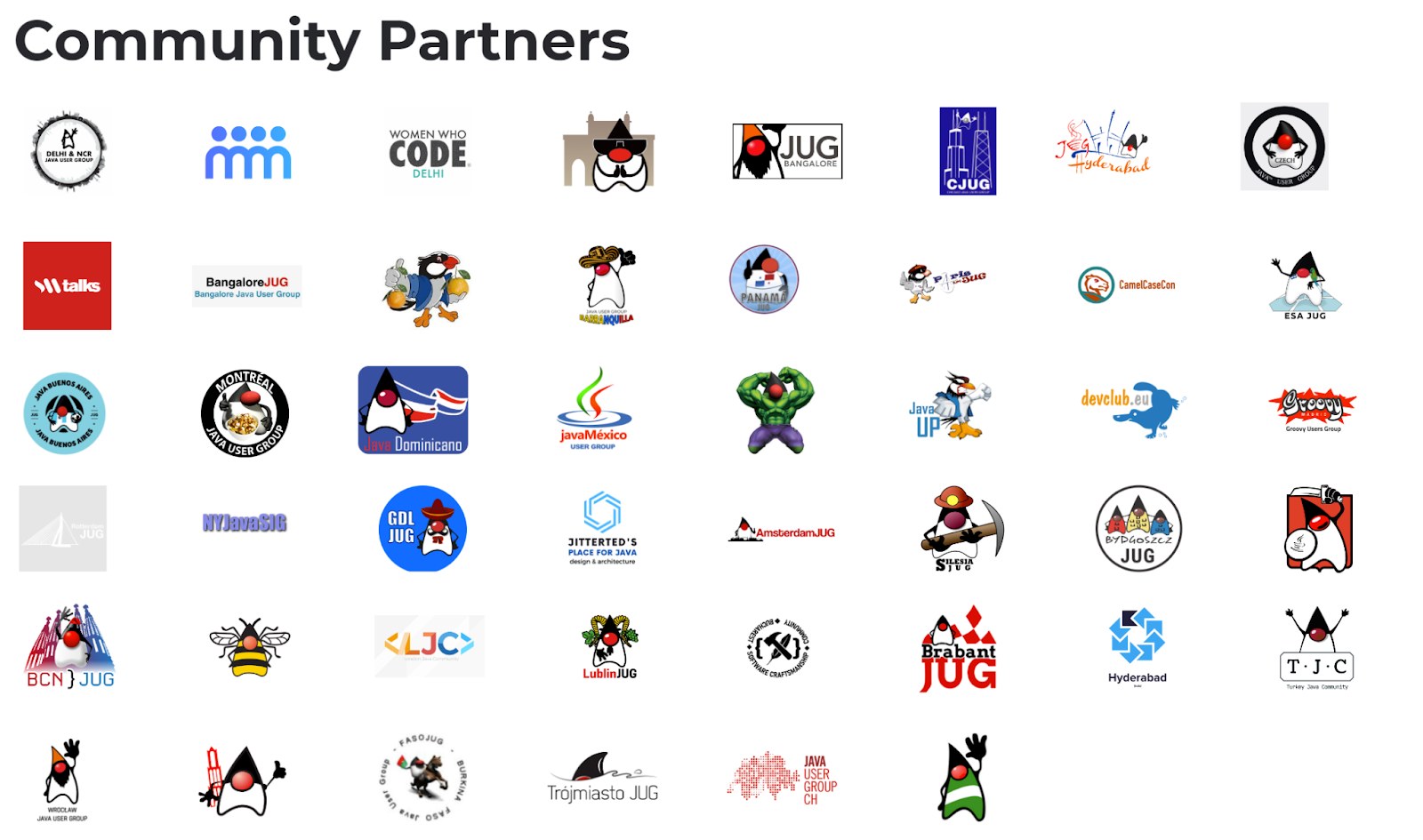
We thank everyone who participated in this event by viewing the online sessions, asking or answering questions, and sharing their learning or experiences with others. This event wouldn’t have been possible without your love and support.
Link to the recordings of the sessions hosted on this conference
I’m pleased to share that all the sessions we streamed live on this conference have been published on IntelliJ IDEA’s YouTube Channel. I’m including the link to all these sessions. Let’s start with the sessions presented on the first day of this event, that is, 29th September, 2022.
Keynote: Surviving Open Source, by Donald Raab
Open-source – we hear this phrase more often than before. But what does it mean to “contribute” to open-source projects? If you have ever contributed to an Open Source project, or lead and maintain one, you’ll know it isn’t easy to sustain it with personal and professional commitments.
Check out this event’s keynote by one of most amazing Java Champions, Donald Raab, creator of the OSS Java Library Eclipse Collections and an active open source contributor for over two decades. Learn from his story on how to survive contributing to open source – the road blocks, failures, challenges, collaboration, rewards and contentment. Click on this link to view the session slides.
Let’s Set Sail With Fleet!, by Vitaly Bragilevsky
Fleet is a brand-new lightweight distributed IDE from JetBrains. In this session, Vitaly demonstrated what Fleet is and how to use it. He covered Fleet’s main features, including working with many programming languages, and remote collaboration. He also talked about Fleet’s distributed architecture. If you are wondering about Fleet replacing IntelliJ IDEA, the simple answer is no. To find out all the answers, check out this session’s recording. Vitaly didn’t use any slides.
Should I Upgrade to Java 17?, by Nikhil Nanivadekar
Upgrading to a newer version of a language is not a simple decision. It depends on a number of factors that are specific to your application, team, deployment, user, and others. But every action, or lack of it, has consequences.
In this session, Nikhil provided the necessary data points and explanations to make a compelling argument for an upgrade from Java 8 or Java 11 to Java 17. He covered new Java features, demonstrated improvements, provided performance comparisons, and briefly discussed upgrade strategies. This talk hoped to help you make an informed decision on the question “Should I upgrade to Java 17?”. Click on this link to access the session slides.
Event Streaming and Processing Using Apache Pulsar, by Mary Grygleski
In this talk, Mary talked about how event streaming fits into the modern software development design and architecture, and some of the challenges it faces especially in the Cloud Native environment. She also talked about how developers could use Apache Pulsar, an open source platform, for distributed messaging and streaming, to create highly responsive applications with real-time capabilities. Click on this link to access the session slides.
Kubernetes Native Java, by Josh Long
How many times do you think – no matter what the topic is – if the speaker is XYZ, I will definitely learn and improve myself by attending the session. In the previous sentence, I could easily replace XYZ with Josh Long.
Josh live coded his session, demonstrating to developers how to use Spring and Kubernetes to develop fast, cloud-native, and scalable services.
Idiomatic Kotlin, by Anton Arhipov
In his talk, Anton highlighted how learning the best practices of Kotlin would help developers take its full advantage. He highlighted how it could be easy to start using Kotlin — it’s like Java, so your experience will easily let you start programming in Java style. However, to take full advantage of the language, learning Kotlin’s best practices is a must. Kotlin provides a number of features for writing concise and readable code. In this session, Anton talked about Kotlin features that make the programs look beautiful and more readable. Click on this link to view the session slides.
Wish You Were Here: Stories of Building a Remote Development IDE, by Matt Ellis
The world is witnessing a rise in the development teams, with a few or all remote members. This could pose a new challenge in terms of how organizations can help all their team members take advantage of the powerful machines that they own during the development stages.
One of the coolest developer advocates at JetBrains, Matt Ellis, addressed this and more. He talked about how JetBrains IDEs, such as Rider, IntelliJ IDEA and WebStorm, can run partially on remote servers and laptops, and still feel as if you are interacting with a local application. He also talked about features of collaborative code development in JetBrains IDES to help developers.
Evolving JUnit 5, by Marc Philipp
Testing is a crucial part of all applications and JUnit 5 is no stranger to Java developers. In this talk, Marc Philipp presented new JUnit 5 features such as declarative test suites, custom JFR events, new extension points, improved support for temporary directories, test method/class execution order, and the new XML reporting format. Click on this link to access the session slides.
Project Loom: Revolution in Concurrency or Obscure Implementation Detail?, by Tomasz Nurkiewicz
Project Loom has been in works for quite a long time at Oracle. Sections of this project have been accessible to the developers, such as the Virtual Threads, in Java 19, as a preview feature. Virtual threads are lightweight and have a low memory and scheduling footprint. They might revolutionize how you perceive blocking operations, Reactive frameworks and APIs, and develop concurrent code.
In this session, Tomasz covered Project Loom and its details. He also compared virtual threads to similar features in other JVM languages like coroutines in Kotlin, and talked about other challenges and solutions. This was an interesting session.
JavaFX for Mobile Development, by Gail Anderson
My first Java project was about developing a Java Swing application and it is difficult to look away when anyone talks about UI in Java.
In this talk, Gail Anderson talked about creating UI in Java, though using another library. She talked about the JavaFX toolkit and how it offers a powerful API. Gail covered how to create mobile applications that target both Apple App stores (iOS) and Google Play (Android) using the exact same JavaFX code base. Also, since JavaFX is Java, she showcased how developers can use the modern features of Java, such as lambdas, streams, records, and the new switch syntax. Click on this link to access the code for the TiltMaze game and this link to view the session slides.
Links to some Twitter posts on this conference
Always something to learn from @TheDonRaab at #IntelliJIDEAConf at https://t.co/VFFtMXUF2d pic.twitter.com/KEWUFIkONl
— Neha Sardana (@nehasardana09) September 29, 2022
Attending IntelliJ IDEA Conf 2022 – Day 1 ♥️💻
Watching keynote… Sitting infront of my computer in my college dorm room 😆😆#IntelliJIDEAConf @intellijidea pic.twitter.com/o5vUPAEOhl— Dilshan Karunarathne (@DilshanKarunar8) September 29, 2022
Guys there is an event organized by ‘IntelliJ IDEA Conf’, it is a free, virtual conference on September 29-30, 2022. The following link for conference details, sessions and speakers:https://t.co/RM6fdGFoXe#IntelliJIDEAConf
— Geovanny Mendoza 🇨🇴🥃 (@geovanny0401) September 2, 2022
My reactions after landing in the middle of @marcphilipp‘s session at #IntelliJIDEAConf
10 seconds: 😯
30 seconds: 😲
4 minutes: 😱
at of session: 🤯 https://t.co/OPGDu9bp8X— Kedar Joshi (@kedarjoshi) September 30, 2022
Attending #IntelliJIDEAConf from my sidecar Mac setup. #devlife #Java pic.twitter.com/4SQqyqRypl
— Susanne Pieterse (@Susivic) September 30, 2022
You are cordially invited to participate in this great conference this September 29th and 30th.
Click here: 👇👇👇👇https://t.co/Q5Ug3QQ8sN#IntelliJIDEAConf pic.twitter.com/zWGuPjlZ04
— Barranquilla JUG 🇨🇴 (@JUGBAQ) September 7, 2022
Look what I got in the mail today. Thanks, @intellijidea! 😍 #IntelliJIDEAConf pic.twitter.com/MooNByVnaL
— Marc Philipp (@marcphilipp) October 26, 2022
Time is limited, I can only commit to watching 1 #IntelliJIDEAConf talk today.
Let it be “Idiomatic Kotlin” by @antonarhipov 😆Detailed agenda: https://t.co/fk01w4TR16
❤️ https://t.co/7Vj61vVBao pic.twitter.com/AwHC1APHGE— Nikita Koselev (@NikitaKoselev) September 30, 2022
Join IntelliJ IDEA Conf 2022 – Day 1
And grab a knowledge from amazing speakers.#IntelliJIDEAConfHere is a link https://t.co/yydJMpqH5B pic.twitter.com/YhoMpuDgdh
— Bhagyashri Patil (@BhagyashriPrak2) September 29, 2022
Thank you to @intellijidea , @jetbrains and everyone who made #IntelliJIDEAConf possible. I took some time and create a summary of the conference, here is Day 2 summary
Speakers: @antonarhipov Mathew Ellis on LinkedIn @marcphilipp @tnurkiewicz @gail_asgteach
Made by @excalidraw pic.twitter.com/1EZ4UIfEjj— Dimitar Tomov (@dimtomov) October 3, 2022
An excellent presentation on Stories of building a remote development IDE by Matt Ellis. Looking forward to presentation on Evolving JUnit 5 which is starting soon. Also two more interesting topics are lined up- Project loom and JavaFX for mobile. Join in. #IntelliJIDEAConf https://t.co/lBApBrhRiH
— Alok Kalyankar (@aawaak) September 30, 2022
Wanna know more about performance improvements? #IntelliJIDEAConf #Java https://t.co/mcGrYdXfxi
— Bhagyashri Patil (@BhagyashriPrak2) September 29, 2022
Waking up for a 5am conference, i need more caffeine in my java#IntelliJIDEAConf
— Dado Ben-David (@dadobendavid) September 30, 2022
Amazing presentation of @TheDonRaab on #IntelliJIDEAConf. Just only not about #opensource #eclipsecollections but how all of us need to get a balanced life style.
— Robert Resende (@rlresende) September 29, 2022
🔊🔊🔊
I will be attending IntelliJ IDEA Conf on Sep 29 – 30, 2022.
For registration & details, pls check in order not to miss that great opportunity to listen tech leaders👇🏻👇🏻👇🏻https://t.co/xJpTvppDWQ#IntelliJIDEAConf
— Evren Tan (@evrn_tan) September 15, 2022
Help us improve your learning experience
We invite you to share your feedback on IntelliJ IDEA Conf 2022 and also your expectations on similar online conference that we plan to host in the future. Please comment on this post and help us understand what topics or speakers would you prefer us to host, and any other improvements.
Summary
IntelliJ IDEA Conf 2022 hosted ten talks, over two days, by industry leaders and speakers on a variety of topics. All these talks are hosted on IntelliJ IDEA’s YouTube channel.
At JetBrains, we all hope you learn something new from these talks and grow your career in this year and beyond.
Subscribe to IntelliJ IDEA Blog updates


